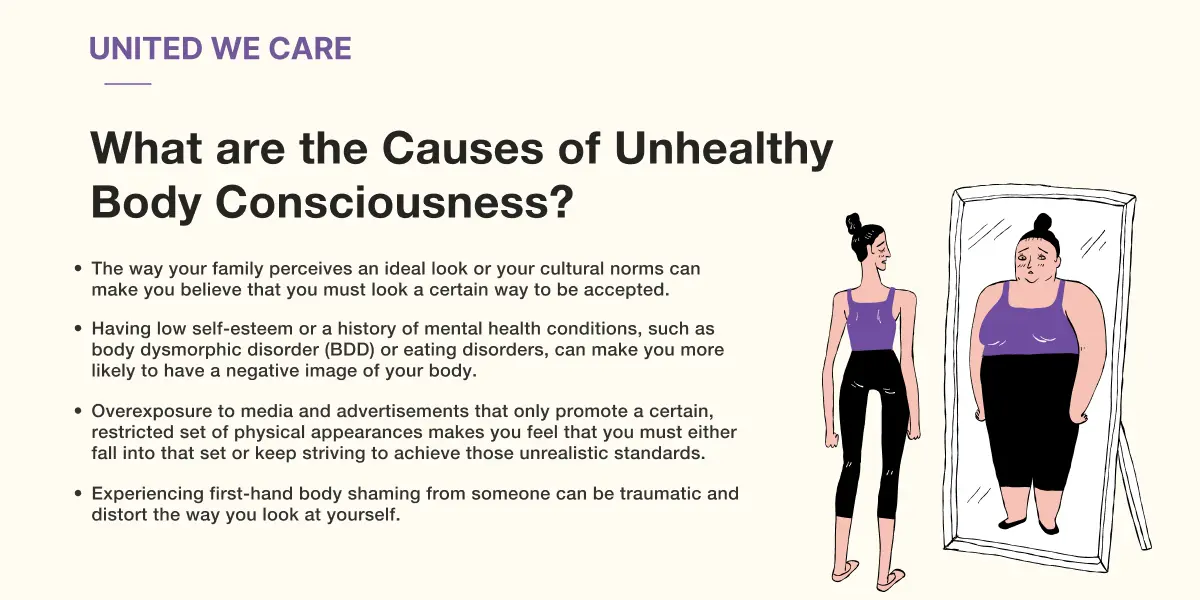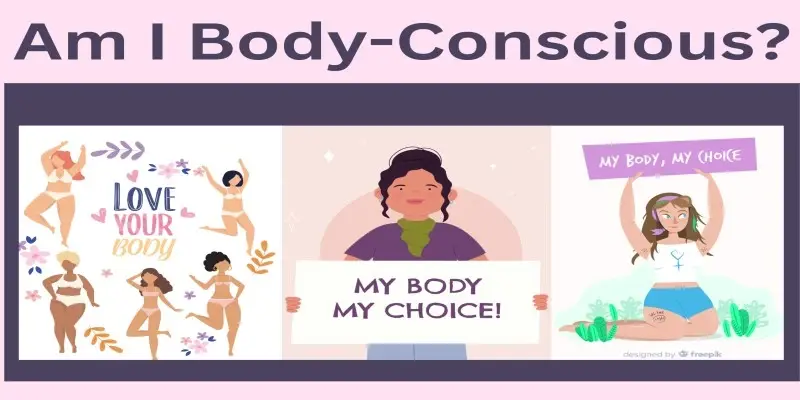Introduction
For ages, our society has preferred and desired certain kinds of physical appearances. With the rise of social media, we are being flooded with ideas of what “ideal” bodies look like. The problem with this is that this ideal is very narrow and restricted, which has significantly heightened our awareness about our appearance and, in some cases, made people feel pressured to conform to an unattainable standard. People of all ages and backgrounds alike are falling for this conjured ideal by becoming too body-conscious.
In this blog, we’ll go over the concept of being body-conscious and its range from healthy awareness to an unhealthy obsession, how it impacts your mental health, and how you can overcome being too conscious by creating a positive body image.
What Is The Meaning Of Being Body-Conscious?
The awareness you have about your body and the way you perceive your physical appearance is known as being conscious about your body. Being body-conscious in itself is not a negative thing. The question is- to what degree are you conscious about your body?
If you accept the imperfections of your body, if you respect and appreciate what your body does for you to keep you healthy and alive, if you nourish and move your body because you truly care about yourself, and if your self-esteem is not tied to the way you look physically, then your body consciousness is leaning towards a healthy awareness of your body.[1] Having this kind of approach can lead to a balanced lifestyle and improve your overall well-being.
On the other hand, if you’re ashamed of your body and are constantly worried about the way you look, if you make attempts to alter your appearance through excessive dieting, exercising, cosmetics, or procedures, and if because of these behaviors, your daily life and relationships are impacted negatively, then you are unhealthily and obsessively body-conscious.
Causes of Unhealthy Body Consciousness

- The way your family perceives an ideal look or your cultural norms can make you believe that you must look a certain way to be accepted.
- Having low self-esteem or a history of mental health conditions, such as body dysmorphic disorder (BDD) or eating disorders, can make you more likely to have a negative image of your body.
- Overexposure to media and advertisements that only promote a certain, restricted set of physical appearances makes you feel that you must either fall into that set or keep striving to achieve those unrealistic standards.
- Experiencing first-hand body shaming from someone can be traumatic and distort the way you look at yourself.
Am I Body-Conscious?
If you identify with being unhealthily conscious of your body, it can negatively affect your mental, emotional, and physical well-being. You may look out for symptoms such as:
- You’re spending a lot of time thinking about and criticizing your own body.
- Even if you’re able to change or improve the way you look, you still feel disappointed in your body.
- You’re constantly comparing yourself to others.
- Either you spend way too much time in front of the mirror grooming yourself, or you avoid any kind of mirrors altogether.
- You’re not eating well and normally. You may either be restricting yourself from eating enough or engaging in binge eating.
- You exercise not to keep your body healthy but to change the way you look.
- You wear only certain kinds of clothes that help you hide the body parts you feel are flawed and don’t deserve to be seen. You may even have gotten a cosmetic procedure done to hide these parts. [2]
- You’re avoiding social settings in order for others not to judge you on your appearance.
- You experience physical symptoms such as significant weight loss, fatigue, deficiencies, etc.
- You aren’t able to focus on work and personal relationships. You may have given up your hobbies because you’re only concerned about your appearance.
Impact of Being Body-Conscious On Mental Health
Being unhealthily conscious of your body can have significant negative impacts on your overall well-being.
- If you believe that your worth is determined by the way you look, it can result in low self-esteem when you can’t meet certain standards of appearance.
- Your negative self-talk about your body may mentally and emotionally drain you, which in some cases can result in anxiety, depression, body dysmorphic disorder (BDD), and eating disorders.[3]
- You may even become socially isolated because you feel embarrassed about the way you look.
- You constantly fear someone might judge your body, which creates an environment of mistrust in your relationships.
- You may find that your focus and productivity have significantly decreased, and your work is being negatively impacted due to it.
Some people may resort to substance abuse to cope with their negative feelings about their bodies.
How To Not Be Body-Conscious?
If you are being obsessively critical of your physical appearance, you must begin to overcome this behavior by recognizing your negative thoughts and then challenge them by asking yourself if they’re based in fact or external opinions and societal standards. If it’s the latter, you must remind yourself that those standards are unattainable, and it’s not on you to achieve them.
It would help if you also were kind to yourself as you would to a dear friend. Acknowledging that it’s okay to have imperfections can help. You may also practice positive affirmations such as “I unconditionally accept and love myself just as I am,” “I am thankful for my body’s strength,” etc.
Take note of the kind of people you surround yourself with and the content you are consuming on social media. If there are people or online pages that make you feel bad about your body, stop engaging with them. Actively engage with people and creators who support body positivity.
Learn to truly treat your body right by nourishing it with healthy foods and engaging in physical activities that you like. Be patient with yourself.
Conclusion
Being conscious of your body lies on a spectrum. On one end, you may have a healthy awareness of your body accompanied by feelings of high self-worth and a genuine acceptance and love for your body. On the other end, this consciousness can manifest into an unhealthy preoccupation with your physical appearance, so much so that you may resort to unhealthy coping mechanisms to achieve a particular standard of appearance. Challenging your negative thoughts, practicing positive affirmations and body positivity, and learning to care for your body truly can help you overcome this unhealthy obsession. Book a session with one of our mental health experts, who can help you switch your behavior from unhealthy body consciousness to healthy body awareness. At United We Care, we offer the most appropriate, clinically backed solutions for all your needs for well-being.
References:
[1] R. Shusterman, “Self-Care and Bodies,” University of Wisconsin-Madison, [Online]. Available: https://uwethicsofcare.gws.wisc.edu/wp-content/uploads/2020/03/Shusterman-Self-Care-and-Bodies.pdf. Accessed on: Nov. 20, 2023
[2] David B Sarwer, Canice E Crerand, Body image and cosmetic medical treatments, Body Image, Volume 1, Issue 1, 2004, Pages 99-111, ISSN 1740-1445,
https://doi.org/10.1016/S1740-1445(03)00003-2. Accessed on: Nov. 20, 2023
[3] Kim Woodward, Doris McIlwain & Jonathan Mond (2019) Feelings about the self and body in eating disturbances: The role of internalized shame, self-esteem, externalized self-perceptions, and body shame, Self and Identity, 18:2, 159-182, DOI: 10.1080/15298868.2017.1403373. Nov. 20, 2023










